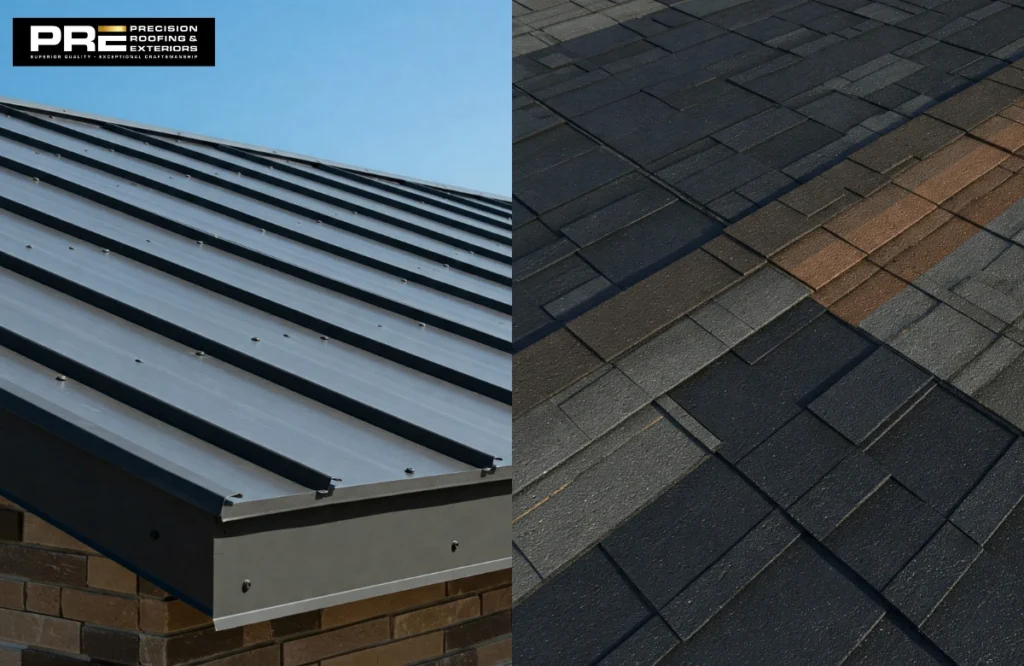Selecting the appropriate roof for your home is vital for strength, longevity, and functionality. Metal roofs (be it zinc or aluminum) are long-lasting and require low maintenance, whereas composite roofs are affordable and easy to install. Other factors like weather resistance, soundproofing, and aesthetics also affect the decision.
Resale value and eco-friendliness are also important in determining what material works best for you. With a thorough comparison of these elements, you can find out, whether a metal roof or composite roof works best for your property.
Metal Roof vs. Composite Roof
To choose the right type of roof for your home, you have to consider several factors like durability, longevity, cost, maintenance, energy efficiency, environmental impact, functionality, installation, weather resistance, insulation, and resale value. When deciding between metal roof installation and composite roofs, it’s important to weigh these factors carefully. Read this detailed comparison to help you make an informed decision when choosing between metal and composite roofs.
Durability and Longevity
Metal roofs are very durable, can last 40–70 years and require little maintenance. It withstands severe weather, including gale force winds, hail and fire. Metal will not rot, crack or warp over time.
Composite roofs have a lifespan of around 20–50 years, depending on the quality of the materials. They resist impacts well, though lower-quality ones may still suffer damage.
Cost Comparison
While the upfront cost can be a significant outlay, its long service life and low maintenance mean metal roofs can often be the cheaper option over the long run.
Composite roofs are less expensive upfront, ranging from $3 to $8 per square foot. While they may need to be changed more often, they are still an economical option for many homeowners.
Maintenance and Repairs
When newly installed, metal roofs only need maintenance with occasional checks for rust, loose fasteners, or failing sealants. They aren’t repaired often, but when they are, they can be expensive.
Composite roofs require repair services more frequently, such as examining for missing or curled shingles and leaks. It’s easy to repair and costs much less than those metallic roofs.
Energy Efficiency
Metal tends to reflect the sun’s heat, which lowers cooling costs in hot climates. Some coatings also increase reflectivity and promote energy efficiency, making them great choices for eco-friendly homeowners.
Composite shingles hold heat more than other materials and can raise cooling costs. Some top-quality shingles are coated to reflect sunlight, which can help with energy efficiency.
Environmental Impact
Metal roofing is environment-friendly, composed of recycled materials, and fully recyclable once it reaches the end of its service life. Its long life also creates less waste than other types of roof materials.
Many composite roofs are made of petroleum-based materials, making them less environmentally friendly. Although manufacturers use reused pieces, the disposal process itself can add to landfill waste.
Functional Benefits and Usability
Metal roofs come in many varieties, including standing seam, corrugated, and metal tiles. They are available in various colors and finishes to match different architectural styles.
Composite roofs mimic natural products like wood, slate, or tile. They have a classic look and come in a variety of colors and textures to suit any home design.
Installation Complexity
Metal roofs require specialized labor for installation, usually leading to higher labor costs. It involves paying attention to exact measurements, fastening methods, and good ventilation.
Simpler and faster to install, composite shingles are a go-to option for homeowners and contractors. They demand less specialized tools and expertise.
Weather Resistance
Metal roofs have exceptional ability to withstand harsh climates, such as heavy rainfall, snowy conditions, and high winds. Metal is not moisture-absorbent, which minimizes mold and mildew risks.
Most composite roof varieties hold up well under moderate conditions but do get affected by extreme UV rays during long periods of exposure, heavy rain and strong winds.
Noise and Insulation
Metal roofs can be louder during rain or hail, but well-installed insulation and underlayment reduce sound transmission.
Composite roofing is quieter due to the material composition, and it does not need further modification.
Resale Value and ROI
Metal roofs increase the property value in most cases as they do provide durability and energy efficiency with a long lifespan.
Composite roofs have good ROI when using high-quality shingles, but long-term value may be lower than metal roofs.
Conclusion
Choosing the best type of roofing is based on pricing, maintenance, efficiency, and long-term value. While metal roofs offer superior strength, excellent weather resistance, and low maintenance, their upfront costs are a disadvantage. Composite roofs tend to be cheaper and easier to install and have a more traditional look and feel but require extra maintenance. Moreover, factors such as soundproofing, eco-friendliness, and resale value contribute to the ultimate decision.
With this knowledge, you can confidently decide which one out of metal vs. composite roof is best for your property. At Precision Roofing, a trusted roofing company, we offer quality roofing products and services. We have years of experience offering installation, maintenance, and repair services.

